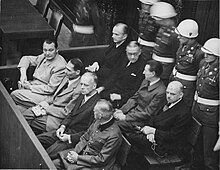Judgment at Nuremberg
Judgment at Nuremberg (in Spain, Winners or losers?; in Latin America, The Nuremberg Trial and Trial at Nuremberg) is a 1961 American film produced and directed by Stanley Kramer with an ensemble cast. of American and European stars.
The film is based on a script written for television. The result had aired as an episode of the CBS anthology series Playhouse 90; In it, Maximilian Schell and Werner Klemperer played the same characters as in the 1961 feature film, which focuses on the historic Nuremberg trials and is made with the perspective of 15 years since the end of the Second World War.
The film develops at such a crucial moment the position of certain people, especially judges who applied Nazi law during the Third Reich in Germany, underlying the historical dilemma of the possible responsibility of the German people regarding the Holocaust. The trial that develops the film includes the testimony of the main witness of a trial held during Nazism, the true "Katzenberger case" in which a Jew was accused of "improper relationship" with an Aryan woman and sentenced to death in 1942.
First of AFI's 10 Top 10 in the "Court Films" category.
Plot
Dan Haywood, a retired American magistrate, arrives in the city of Nuremberg in 1948 to take charge of the difficult task of judging, once the Nazi hierarchs were prosecuted, four judges for their complicity in the application of the sterilization and punishment policies of death of the Third Reich. Before the court, the defense and the prosecution will confront their positions on whether or not the Nazi judges were aware of the extermination that the German government was carrying out, relying on witnesses who suffered this unjust policy. While the inconveniences of the defeated side are being judged, the Cold War is emerging between the victors (allied side), and occupied Germany will have to rebuild its country (divided into 4) and forget the vestiges of the war and the previous regime.
The film examines the issues of individual complicity of citizens in crimes committed by the State, as well as a broad moral and ethical journey on the value of human rights. The script was not propaganda in nature, since it directly addresses even the most complicated issues. For example, defense attorney Hans Rolfe raises thorny arguments such as the US Supreme Court's support for eugenics practices or Winston Churchill's words of praise for Hitler. One notable scene is the testimony of Rudolph Petersen, a German baker who, with deficient mental faculties, was sterilized by order of the Nazis, according to the social laws of the Third Reich.
Finally, the court, at the proposal of its president and with the vote against one of the judges, found them guilty for what they did and sentenced them to life imprisonment.
Cast
| Performer | Paper |
|---|---|
| Spencer Tracy | Chief Judge Dan Haywood |
| Burt Lancaster | Dr. Ernst Janning (judged) |
| Richard Widmark | Colonel Tad Lawson (indictment attorney) |
| Marlene Dietrich | Mrs. Bertholt |
| Maximilian Schell | Hans Rolfe (principal defence counsel) |
| Judy Garland | Mrs. Irene Hoffman Wallner |
| Montgomery Clift | Rudolph Petersen (indictment testimony) |
| Ed Binns | Sen. Burkette |
| Werner Klemperer | Emil Hahn (judged) |
| Torben Meyer | Werner Lampe (judged) |
| Martin Brandt | Friedrich Hofstetter (judged) |
| William Shatner | Captain Harrison Byers (Haywood helper) |
Awards and nominations
Judgment at Nuremberg was well recognized in terms of awards and nominations in the year of its release, and was a favorite at the Oscars with 11 nominations. Some of those awards are the following:
- Oscar Prizes 1961
| Category | Candidate/s | Outcome |
|---|---|---|
| Oscar to the best movie | Stanley Kramer | Candidate |
| Oscar the best director | Stanley Kramer | Candidate |
| Oscar the best actor | Spencer Tracy | Candidate |
| Oscar the best actor | Maximilian Schell | Winner |
| Oscar the best cast actor | Montgomery Clift | Candidate |
| Oscar to the best cast actress | Judy Garland | Candidate |
| Oscar the best script adapted | Abby Mann | Winner |
| Oscar the best assembly | Frederic Knudtson | Candidate |
| Oscar to the best photography - Black and White | Ernest Laszlo | Candidate |
| Oscar to the best artistic direction - Black and White | Rudolph Sternad George Milo | Candidate |
| Oscar to the best costume design - Black and White | Jean Louis | Candidate |
- Gold Globes Awards
| Category | Candidate/s | Outcome |
|---|---|---|
| Golden Globe to the Best Film - Drama | Stanley Kramer | Candidate |
| Golden Globe to the best director | Stanley Kramer | Winner |
| Golden Globe to the best actor - Drama | Maximilian Schell | Winner |
| Golden Globe to the best cast actor | Montgomery Clift | Candidate |
| Golden Globe to the best cast actress | Judy Garland | Candidate |
| Golden Globe to the Best Film promotion of international understanding | Stanley Kramer | Candidate |
- 18th edition of the Medals of the Film Writers Circle
| Category | Nominated | Outcome |
|---|---|---|
| Best foreign film | Judgment at Nuremberg | Winner |
Contenido relacionado
13th century
Sabadell
Burgos Province


